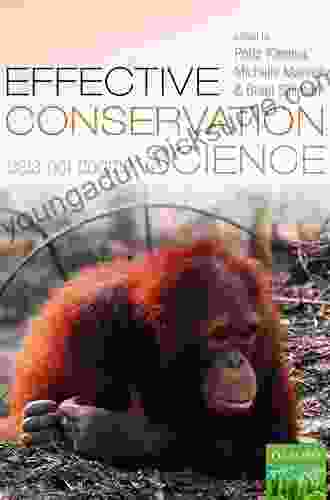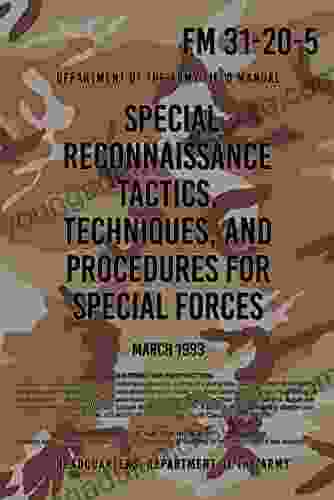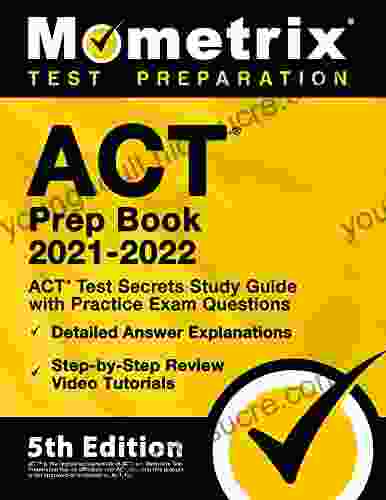Effective Conservation Science: Data, Not Dogma

5 out of 5
| Language | : | English |
| File size | : | 17128 KB |
| Screen Reader | : | Supported |
| Print length | : | 384 pages |
| Lending | : | Enabled |
Conservation science is a field that uses scientific methods to inform conservation decisions. It is based on the idea that we can better protect and manage our natural resources by understanding how they work. However, conservation science is not always easy. There is a lot of uncertainty and complexity in natural systems, and it can be difficult to know what actions will be most effective.
As a result, it is important to use the best available data to make decisions, and to be open to changing our minds as new information becomes available. This is not always easy, especially when there is a lot of pressure to take action. However, it is the only way to ensure that our conservation efforts are effective.
The Importance of Data
Data is essential for conservation science. It allows us to understand how natural systems work, and to identify the threats that they face. Data can also help us to evaluate the effectiveness of conservation interventions, and to make decisions about how to allocate resources.
There are many different types of data that can be used for conservation science. Some of the most important types of data include:
- Species data: This data includes information about the distribution, abundance, and population trends of different species.
- Habitat data: This data includes information about the type, quality, and quantity of habitat available to different species.
- Threat data: This data includes information about the threats that different species face, such as habitat loss, pollution, and climate change.
- Monitoring data: This data includes information about the changes that are occurring in natural systems over time.
Data can be collected from a variety of sources, including field surveys, remote sensing, and citizen science projects. It is important to use a variety of data sources to get a complete picture of a natural system.
The Role of Dogma in Conservation
Dogma is a belief that is not based on evidence. It is often based on tradition, superstition, or personal opinion. Dogma can be a barrier to effective conservation science, because it can prevent us from considering new ideas and approaches.
There are many different types of dogma in conservation. Some of the most common types of dogma include:
- The belief that we should always protect all species. This dogma can lead to the neglect of common species in favor of rare species, even when the common species are more important for the overall health of an ecosystem.
- The belief that we should always use natural methods to control pests and diseases. This dogma can lead to the use of ineffective and even harmful methods, such as the use of pesticides.
- The belief that we should never intervene in natural systems. This dogma can lead to the loss of species and ecosystems, as we fail to take action to address threats such as habitat loss and climate change.
Dogma can be a barrier to effective conservation science, but it can also be a force for good. Dogma can help to focus our efforts and to provide a sense of purpose. However, it is important to be aware of the dangers of dogma, and to be open to changing our minds as new information becomes available.
Conservation science is a complex and challenging field. However, it is also an essential field, as it provides us with the knowledge we need to protect and manage our natural resources. By using the best available data and being open to changing our minds as new information becomes available, we can ensure that our conservation efforts are effective.
5 out of 5
| Language | : | English |
| File size | : | 17128 KB |
| Screen Reader | : | Supported |
| Print length | : | 384 pages |
| Lending | : | Enabled |
Do you want to contribute by writing guest posts on this blog?
Please contact us and send us a resume of previous articles that you have written.
 Fiction
Fiction Non Fiction
Non Fiction Romance
Romance Mystery
Mystery Thriller
Thriller SciFi
SciFi Fantasy
Fantasy Horror
Horror Biography
Biography Selfhelp
Selfhelp Business
Business History
History Classics
Classics Poetry
Poetry Childrens
Childrens Young Adult
Young Adult Educational
Educational Cooking
Cooking Travel
Travel Lifestyle
Lifestyle Spirituality
Spirituality Health
Health Fitness
Fitness Technology
Technology Science
Science Arts
Arts Crafts
Crafts DIY
DIY Gardening
Gardening Petcare
Petcare Carol Ann Gillespie
Carol Ann Gillespie Jim Saccomano
Jim Saccomano Jenny Smith
Jenny Smith Bob Gordon
Bob Gordon Kevin J Gaston
Kevin J Gaston Stefan Hunziker
Stefan Hunziker Richard Lee Byers
Richard Lee Byers Neveen Musa
Neveen Musa Julia Reed
Julia Reed Scott Turner
Scott Turner Ashley P Martin
Ashley P Martin Shenila Khoja Moolji
Shenila Khoja Moolji Rebecca Boggs Roberts
Rebecca Boggs Roberts Jessica Jung
Jessica Jung Sir Edmund Hillary
Sir Edmund Hillary Jim Prime
Jim Prime Caryl Say
Caryl Say Raynor Winn
Raynor Winn Emiko Jean
Emiko Jean Tj Faultz
Tj Faultz Richard G Brown
Richard G Brown Kathy Freston
Kathy Freston Nathaniel Rich
Nathaniel Rich Tanya Lee Stone
Tanya Lee Stone Ryan D Agostino
Ryan D Agostino Janet Menzies
Janet Menzies Troy A Hill
Troy A Hill Jeff Mach
Jeff Mach Catherine Mccord
Catherine Mccord Jessica Wolstenholm
Jessica Wolstenholm Emma Dalton
Emma Dalton Angelo Chiari
Angelo Chiari Donald N Yates
Donald N Yates Fredrik Backman
Fredrik Backman John C Maxwell
John C Maxwell Emily Souder
Emily Souder Pete Sampras
Pete Sampras Robin Yocum
Robin Yocum Kristen S Kurland
Kristen S Kurland Rod Powers
Rod Powers Linda Sivertsen
Linda Sivertsen Adam Skolnick
Adam Skolnick Joel J Lerner
Joel J Lerner S L Macgregor Mathers
S L Macgregor Mathers Massimo Florio
Massimo Florio Kathy Hoopmann
Kathy Hoopmann Mark J Musser
Mark J Musser Miles Olson
Miles Olson Hourly History
Hourly History Otto Rahn
Otto Rahn Nicholas Jubber
Nicholas Jubber Siena Cherson Siegel
Siena Cherson Siegel Angela C Wu
Angela C Wu Jordan Summers
Jordan Summers Christopher Nyerges
Christopher Nyerges J D Swanson
J D Swanson Stacy Mccullough
Stacy Mccullough Rawdon Wyatt
Rawdon Wyatt Lisa Marie Mercer
Lisa Marie Mercer Gary B Meisner
Gary B Meisner Sharon Strand Ellison
Sharon Strand Ellison Angela Leslee
Angela Leslee Gillian Price
Gillian Price Emily Nielson
Emily Nielson Jay Matthews
Jay Matthews Dave Gray
Dave Gray David Kinney
David Kinney Angela Stancar Johnson
Angela Stancar Johnson Kat Anderson
Kat Anderson Karl E Peace
Karl E Peace Angelo Tropea
Angelo Tropea Lindsay Ford
Lindsay Ford Tim O Connor
Tim O Connor Bradley T Erford
Bradley T Erford Alberta Hawse
Alberta Hawse Rachel Connelly
Rachel Connelly Third Edition Kindle Edition
Third Edition Kindle Edition Louis Martin
Louis Martin Johnny Molloy
Johnny Molloy Christian Heath
Christian Heath Lucy Postgate
Lucy Postgate Charney Herst
Charney Herst Nick Bradley
Nick Bradley Cheryl Alkon
Cheryl Alkon Daddilife Books
Daddilife Books Robert Zubek
Robert Zubek Tim Hannigan
Tim Hannigan Frederick Aardema
Frederick Aardema Christina Reese
Christina Reese Keith Crowley
Keith Crowley R E Burrillo
R E Burrillo Nikki Ace
Nikki Ace Christina Hillsberg
Christina Hillsberg Frank Deford
Frank Deford Tina Nelson
Tina Nelson Eric Schmitz
Eric Schmitz Chuck Weikert
Chuck Weikert Rachel Hutt Phd
Rachel Hutt Phd Tigran Bagdasaryan
Tigran Bagdasaryan Liv Ryan
Liv Ryan Oliver Burkeman
Oliver Burkeman Keylee C Hargis
Keylee C Hargis John Geiger
John Geiger Stephanie Land
Stephanie Land Dave Duncan
Dave Duncan Mark Kernion
Mark Kernion Erin Moulton
Erin Moulton Joseph Phillips
Joseph Phillips Michael Tomasello
Michael Tomasello T R Fehrenbach
T R Fehrenbach Keith Elliot Greenberg
Keith Elliot Greenberg Patrick M Lencioni
Patrick M Lencioni Andy Jurinko
Andy Jurinko Angel Millar
Angel Millar Mitch Horowitz
Mitch Horowitz Kim West
Kim West Wayne Mcghie
Wayne Mcghie Michael Driscoll
Michael Driscoll Walter Beede
Walter Beede Dean Beaumont
Dean Beaumont Irene Gut Opdyke
Irene Gut Opdyke James Quinn
James Quinn Richard Bate
Richard Bate Tristan Higbee
Tristan Higbee Samir P Desai
Samir P Desai James M Johnston
James M Johnston Bob Clouser
Bob Clouser Eugene P Northrop
Eugene P Northrop William Ayers
William Ayers Mometrix
Mometrix Rachel Kowert
Rachel Kowert George E Hein
George E Hein Robin Ray Green
Robin Ray Green Leonard Lueras
Leonard Lueras Barry Pickthall
Barry Pickthall Yuu Tanaka
Yuu Tanaka Humberto G Garcia
Humberto G Garcia Elizabeth Hunter
Elizabeth Hunter Douglas Henderson Jr
Douglas Henderson Jr Elly Molina
Elly Molina Chip Heath
Chip Heath Marie Myung Ok Lee
Marie Myung Ok Lee W Todd Woodard
W Todd Woodard Marilyn Burgos
Marilyn Burgos Shane O Mara
Shane O Mara David Herres
David Herres Brian Cain
Brian Cain Johnson Egonmwan
Johnson Egonmwan Patrick Pickens
Patrick Pickens Jo May
Jo May Tom Dymond
Tom Dymond Robert Lindsay
Robert Lindsay Mercedes Pollmeier
Mercedes Pollmeier Lynn Lyons
Lynn Lyons Rafael Gordillo Naranjo
Rafael Gordillo Naranjo Capn Fatty Goodlander
Capn Fatty Goodlander Judith Hoare
Judith Hoare George Megre
George Megre Warren St John
Warren St John Robyn Harding
Robyn Harding Guy Evans
Guy Evans Belinda Norton
Belinda Norton Joyce Yang
Joyce Yang Ken Dryden
Ken Dryden Matt Vincent
Matt Vincent Devaki Lakshmi
Devaki Lakshmi Joe Peta
Joe Peta Rick Vaive
Rick Vaive Florian Freistetter
Florian Freistetter David E Jones
David E Jones G K Derosa
G K Derosa Margaret Jordan Halter
Margaret Jordan Halter Mark Lester
Mark Lester Howell Raines
Howell Raines Lee Cronk
Lee Cronk William Bryant Logan
William Bryant Logan Scott Stillman
Scott Stillman Erich Fromm
Erich Fromm Mark Remy
Mark Remy Lidia Bastianich
Lidia Bastianich Ben Ehrenreich
Ben Ehrenreich Jonathan Gottschall
Jonathan Gottschall Greg Prato
Greg Prato Jon Ronson
Jon Ronson John B Nici
John B Nici Judea Pearl
Judea Pearl Wendy Rosenoff
Wendy Rosenoff Dave Smith
Dave Smith Ellen Frank
Ellen Frank Judith S Beck
Judith S Beck Seth Lloyd
Seth Lloyd Lois A Ritter
Lois A Ritter George Noory
George Noory Jodi Shabazz
Jodi Shabazz Stewart Shapiro
Stewart Shapiro Avinash Navlani
Avinash Navlani Chef Maggie Chow
Chef Maggie Chow Richard Hibshman
Richard Hibshman Robert Kirk
Robert Kirk Colby Coombs
Colby Coombs William E Hearn
William E Hearn Rebecca Hemmings
Rebecca Hemmings Mary Pipher
Mary Pipher Harry Fairhead
Harry Fairhead Jeff Fleischer
Jeff Fleischer Kelly Corrigan
Kelly Corrigan Angela Smith
Angela Smith Diana Winston
Diana Winston Nicholas Epley
Nicholas Epley Kenneth R Ginsburg
Kenneth R Ginsburg Yvonne Choquet Bruhat
Yvonne Choquet Bruhat Elizabeth Foss
Elizabeth Foss Ron Douglas
Ron Douglas Shreya Ramachandran
Shreya Ramachandran Bill Schneider
Bill Schneider Tiara Mcclure
Tiara Mcclure Murtaza Haider
Murtaza Haider Stephen Jungmann
Stephen Jungmann Kyle Graves
Kyle Graves Mirabai Starr
Mirabai Starr Andy Crowe
Andy Crowe Chanel Craft Tanner
Chanel Craft Tanner Robb Manning
Robb Manning Angeline Boulley
Angeline Boulley Robert Urban
Robert Urban Jeanne Godfrey
Jeanne Godfrey Caspar Melville
Caspar Melville Tim Thayne
Tim Thayne Katrina Cope
Katrina Cope M J Fievre
M J Fievre Laura Hillman
Laura Hillman K Moriyasu
K Moriyasu Robert Dudley
Robert Dudley Robyn Ryle
Robyn Ryle Margaret Visser
Margaret Visser Ray Walker
Ray Walker Samuel B Green
Samuel B Green Natalie Rhodes
Natalie Rhodes Joseph Mazur
Joseph Mazur Stuart Lawrence
Stuart Lawrence Laura Bogen
Laura Bogen Ron Jeffries
Ron Jeffries Andrea Lankford
Andrea Lankford Nicole Smith
Nicole Smith Danil Zburivsky
Danil Zburivsky Rob Willson
Rob Willson Arlin Smith
Arlin Smith Andy Puddicombe
Andy Puddicombe Sabbithry Persad Mba
Sabbithry Persad Mba Angel Burns
Angel Burns David Goodman
David Goodman Christopher O Kennon
Christopher O Kennon Karen Elliott House
Karen Elliott House Violet White
Violet White Mandee Heller Adler
Mandee Heller Adler Jim Posewitz
Jim Posewitz Kevin Hunter
Kevin Hunter Ruby Lang
Ruby Lang Sandra Steingraber
Sandra Steingraber Jason Hogan
Jason Hogan Rodney Castleden
Rodney Castleden Andy Mitchell
Andy Mitchell Bret A Moore
Bret A Moore Scott Alan Johnston
Scott Alan Johnston Teresa Parker
Teresa Parker Matthew D Dewar
Matthew D Dewar Richard A Muller
Richard A Muller Wynne Foster
Wynne Foster John Samuel Barnett
John Samuel Barnett Chris Santella
Chris Santella Lynn Palm
Lynn Palm Thomas Gilovich
Thomas Gilovich Martin Volken
Martin Volken Thomas Golf
Thomas Golf Connie Schultz
Connie Schultz Angela Eckhoff
Angela Eckhoff Lawrence Goldstone
Lawrence Goldstone Patrick Ejeke
Patrick Ejeke Joe Berardi
Joe Berardi Daniel Friedmann
Daniel Friedmann Robyn Wideman
Robyn Wideman Germano Dalcielo
Germano Dalcielo Elizabeth Kaledin
Elizabeth Kaledin Schoolhouse Heaven
Schoolhouse Heaven Ted Sandling
Ted Sandling Mark Wells
Mark Wells Manik Joshi
Manik Joshi Jenna Helwig
Jenna Helwig Rebecca Eanes
Rebecca Eanes Andy Dowsett
Andy Dowsett Dawn Griffiths
Dawn Griffiths Tovah Feldshuh
Tovah Feldshuh Viviana Altuve
Viviana Altuve Thais Nye Derich
Thais Nye Derich David C Keehn
David C Keehn Howard Davis
Howard Davis Diana Nyad
Diana Nyad Ashley Rickards
Ashley Rickards Rodney Paul
Rodney Paul Latonya J Trotter
Latonya J Trotter Dennis Rainey
Dennis Rainey Eliot Schrefer
Eliot Schrefer Stephen Rea
Stephen Rea Angelo Lowery
Angelo Lowery Kristen Jervis Cacka
Kristen Jervis Cacka Marc Charles
Marc Charles Mike Chambers
Mike Chambers Rebecca Solnit
Rebecca Solnit Carlos Acevedo
Carlos Acevedo Jennifer Bohnet
Jennifer Bohnet Lutz Hanseroth
Lutz Hanseroth Tom Allen
Tom Allen Karl Beecher
Karl Beecher Scott Meyer
Scott Meyer Ryan Beck
Ryan Beck Stephen Lynch
Stephen Lynch Jules Brown
Jules Brown Jessica Nordell
Jessica Nordell Kathryn Miles
Kathryn Miles Phil Burt
Phil Burt Stephen Cheney
Stephen Cheney Cap N Fatty Goodlander
Cap N Fatty Goodlander Alessio Mangoni
Alessio Mangoni Michael V Uschan
Michael V Uschan Andy Schell
Andy Schell Richard L Sites
Richard L Sites Tania N Shah
Tania N Shah Aaron Wilson
Aaron Wilson Stefanie K Johnson
Stefanie K Johnson Dhonielle Clayton
Dhonielle Clayton Tara Sim
Tara Sim Shalabh Aggarwal
Shalabh Aggarwal Jonah Lehrer
Jonah Lehrer Jeremy Klaff
Jeremy Klaff Kristina Statler
Kristina Statler Cory Mortensen
Cory Mortensen Joy Williams
Joy Williams Dr Eva Beaulieu
Dr Eva Beaulieu Susan Burton
Susan Burton Margaret M Quinlan
Margaret M Quinlan Afra J Zomorodian
Afra J Zomorodian Jerry Toner
Jerry Toner Eli Wilson
Eli Wilson Mark Shepherd
Mark Shepherd Donald R Prothero
Donald R Prothero Muako Maepa
Muako Maepa Peter Finch
Peter Finch Ryan Bow
Ryan Bow D M Davis
D M Davis Jane M Healy
Jane M Healy Leanne Ely
Leanne Ely Warren Sande
Warren Sande Ed Stafford
Ed Stafford Jay Griffiths
Jay Griffiths Kari Marie Norgaard
Kari Marie Norgaard Dan Ariely
Dan Ariely Stephen Grossberg
Stephen Grossberg Jorge Ramos Mizael
Jorge Ramos Mizael Donna Mott
Donna Mott Anna Rashbrook
Anna Rashbrook Mark W Steege
Mark W Steege Barak Ariel
Barak Ariel Charlotte Klaar Phd
Charlotte Klaar Phd Cate Tiernan
Cate Tiernan Serena B Miller
Serena B Miller Paul Cobley
Paul Cobley Gregory J Davenport
Gregory J Davenport Ingrid S Clay
Ingrid S Clay Ben Bleiweiss
Ben Bleiweiss Lisa Preston
Lisa Preston Sylvester Nemes
Sylvester Nemes Roger Craig
Roger Craig Alex Wolf
Alex Wolf Carlo Rovelli
Carlo Rovelli Karen Sternheimer
Karen Sternheimer Israelin Shockness
Israelin Shockness Mark Verstegen
Mark Verstegen Jodi Picoult
Jodi Picoult David Graeber
David Graeber Tovar Cerulli
Tovar Cerulli Beth A Leonard
Beth A Leonard Peter Gibson
Peter Gibson Neil Hawkesford
Neil Hawkesford Andy Farrell
Andy Farrell Hajime Isayama
Hajime Isayama George Johnson
George Johnson T L Payne
T L Payne Donna Helen Crisp Jd Msn Rn Pmhcns Bc
Donna Helen Crisp Jd Msn Rn Pmhcns Bc Michael Anthony
Michael Anthony Chris Chelios
Chris Chelios Kevin Thomas
Kevin Thomas Madeleine Roux
Madeleine Roux Kim Foley Mackinnon
Kim Foley Mackinnon Tim Macwelch
Tim Macwelch Robin Benway
Robin Benway Bob Swope
Bob Swope L S Boos
L S Boos Jeffrey Lee
Jeffrey Lee Jeffrey Thurston
Jeffrey Thurston Baby Professor
Baby Professor Tim Larkin
Tim Larkin Robert E Stake
Robert E Stake Angela Thayer
Angela Thayer Angelina J Steffort
Angelina J Steffort Joan Jacobs Brumberg
Joan Jacobs Brumberg Milton Roth
Milton Roth Sam Fury
Sam Fury John Sonmez
John Sonmez Jenna Blough
Jenna Blough Richard Lemaster
Richard Lemaster Joshua Clark
Joshua Clark Ruth Benedict
Ruth Benedict Christian Wiggins
Christian Wiggins Lin Wellford
Lin Wellford Ariel Henley
Ariel Henley Tirzah Price
Tirzah Price Bradley Charbonneau
Bradley Charbonneau Kent David Kelly
Kent David Kelly Rosie Daley
Rosie Daley William D Lopez
William D Lopez Mark Synnott
Mark Synnott Jeffrey T Richelson
Jeffrey T Richelson Rebecca P Cohen
Rebecca P Cohen Pete Dunne
Pete Dunne Bernd Heinrich
Bernd Heinrich Madison Lee
Madison Lee Kim Dragoner
Kim Dragoner United States Government Us Army
United States Government Us Army Mtg Editorial Board
Mtg Editorial Board Tea Rozman Clark
Tea Rozman Clark Ellen J Langer
Ellen J Langer Sam Bleakley
Sam Bleakley Rebecca Serle
Rebecca Serle Forrest Maready
Forrest Maready Petros Efthymiou
Petros Efthymiou Ben Campbell
Ben Campbell Harold S Koplewicz
Harold S Koplewicz Jeffrey Bernstein
Jeffrey Bernstein Jamie Kuykendall
Jamie Kuykendall Meg Long
Meg Long Deborah Wall
Deborah Wall Rufus Estes
Rufus Estes Steve Hindman
Steve Hindman Andy Peloquin
Andy Peloquin Sandy Tolan
Sandy Tolan Peter Townsend
Peter Townsend Mark Rosenman
Mark Rosenman Derek M Steinbacher
Derek M Steinbacher Kate Le Roux
Kate Le Roux Rashaun Johnson
Rashaun Johnson Michele Borba
Michele Borba Andy Tyson
Andy Tyson Roland A Boucher
Roland A Boucher Tom Chatfield
Tom Chatfield Marie Brennan
Marie Brennan Cynthia Nims
Cynthia Nims Dan Heath
Dan Heath Miranda Green
Miranda Green Nicholas D Kristof
Nicholas D Kristof Dwight E Neuenschwander
Dwight E Neuenschwander Gerard Siggins
Gerard Siggins
Light bulbAdvertise smarter! Our strategic ad space ensures maximum exposure. Reserve your spot today!

 Fernando BellCeoe Test Practice Questions: Comprehensive Exam Review for Certification...
Fernando BellCeoe Test Practice Questions: Comprehensive Exam Review for Certification... Eric HayesFollow ·14.3k
Eric HayesFollow ·14.3k Adrien BlairFollow ·16.9k
Adrien BlairFollow ·16.9k Harold BlairFollow ·8.2k
Harold BlairFollow ·8.2k Pat MitchellFollow ·13.3k
Pat MitchellFollow ·13.3k Elton HayesFollow ·8.5k
Elton HayesFollow ·8.5k Banana YoshimotoFollow ·10.1k
Banana YoshimotoFollow ·10.1k Charles ReedFollow ·5.6k
Charles ReedFollow ·5.6k Ted SimmonsFollow ·5.7k
Ted SimmonsFollow ·5.7k

 Devon Mitchell
Devon MitchellDelve into the Comprehensive World of Cartridges: A...
In the realm of firearms, cartridges stand...
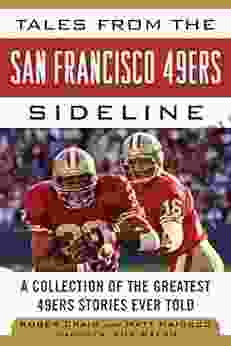
 Joseph Conrad
Joseph ConradTales From The San Francisco 49ers Sideline: A Look...
The San Francisco 49ers are one of the most...

 Ervin Bell
Ervin BellArcGIS Desktop 10: A Comprehensive GIS Tutorial for...
Geographic information...

 Reed Mitchell
Reed MitchellPhysiology Pretest Self Assessment And Review 14th...
Accurately gauge your physiology knowledge and...

 Devin Ross
Devin RossLost At Sea: The Unbelievable True Story of the Jon...
In 2009, journalist Jon Ronson set out to...
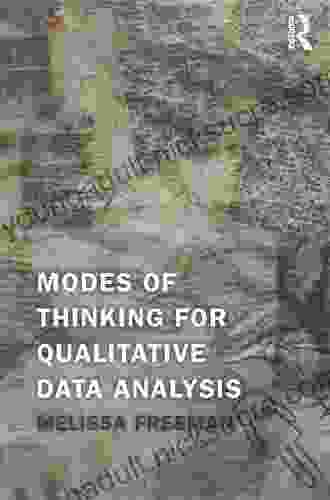
 Shane Blair
Shane BlairModes of Thinking for Qualitative Data Analysis
Qualitative data analysis is a complex...
5 out of 5
| Language | : | English |
| File size | : | 17128 KB |
| Screen Reader | : | Supported |
| Print length | : | 384 pages |
| Lending | : | Enabled |


